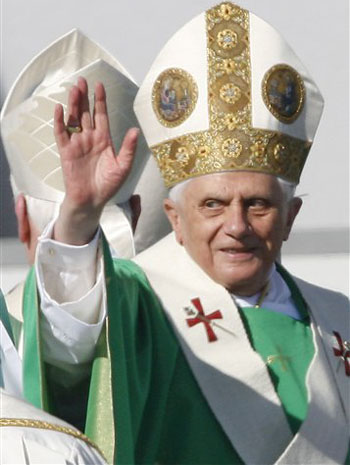According to a recent Zogby telephone survey of over 1000 American Catholics, 55% agree that climate change is a serious problem, versus 22% who do not.
Catholics in the U.S. are also clear on climate science, with 60% recognizing that human activity is a significant contributor to climate change versus 21% who do not believe that. These results are interesting at a time when, according to a Gallup poll, 41% of the overall population believes that the issue of global warming is being exaggerated by the media, despite that according to scientists and journalism scholars, the media has actually underplayed the seriousness of the issue.
Catholicism has a history of finding the intersections between science and faith and climate science offers just such an opportunity. This is particularly true when environmental interests are framed as protecting God’s creation, with three-quarters of Catholics embracing the concept of stewardship of the planet.
And consistent with the longstanding Catholic tradition of concern about the poor, the Zogby poll shows that there is particular worry about the impact of climate change on the poor, both in the U.S. and globally, with almost two-thirds surveyed believing that their faith requires them to be concerned about the effects of global warming on the most vulnerable communities.
It may also explain why more than half of Catholics surveyed believe that wealthier nations have a special obligation to help poorer countries deal with the repercussions of climate change.
Dan Misleh, Executive Director of Catholic Climate Covenant sees Catholic concerns about the environment as very consistent with their upbringing. “Before earth day, there was Genesis and the story of creation. Before St. Francis was the darling of some in the environmental movement, he was a man of deep religious conviction who understood the beauty of all of God’s creatures and that sharing in the lot of the poor people of his day is what God intended and consistent with Jesus’ own life. These teachings, examples and convictions are at the core of our Catholic faith and as climate change unfolds, we are recovering those ancient texts and traditions. In addition, Catholics have a long history of serving those in need…we know the impact of poverty and can see how climate change adds another sad layer to the lives of the most vulnerable that we serve.”
Even Misleh, though, was surprised at how many Catholics (1/3) are aware of Pope Benedict’s teachings and of those, that 90% want to learn more. The position that the Pope and the U.S. Bishops have taken on climate change is one of ‘prudent action in the face of uncertainty’. The majority of Catholics agree with this policy and would like to see immediate action rather than more research and study.
An astonishing 85% of Catholics believe in the church’s teachings about sharing and sacrifice in general and two-thirds believe that material concerns should not supersede concern for others and the environment. More than half of Catholics surveyed believe that a willingness to sacrifice and conserve could help address climate change.
“Like everyone else in our society, people are hearing the message that we need to reduce energy use and try to live more simply,” says Dan Misleh. “For many it is about economics, how can they save some money. For others, they’re caught up in the green movement, not a bad thing. But I believe, too, that Catholic families are concerned about future generations and the shape of the planet for their children and grandchildren. And from an early age, we are taught to be charitable and to stand up for those without a voice in our society.”
The Catholic Climate Covenant is asking Catholics to take the St. Francis Pledge to care for creation and the poor, and many are doing just that.
Misleh says “it’s heartening to know that Catholics feel strongly that they can make a difference in lowering their carbon footprint. Large majorities have or are willing to pray, learn, assess, act and advocate which are the elements of the St. Francis Pledge. And a majority are willing to make sacrifices, exercise restraint and share more of what they have with those who have too little.” In fact the Zogby survey shows that large majorities (87% – 94%) of Catholics are already or willing to engage in most of these activities. The number comes down (68%) when it comes to advocacy, but it still remains a strong majority of Catholics already or willing to speak out publicly about climate issues.
The Catholic Climate Covenant is part of the National Religious Partnership for the Environment founded in 1992. Other members include the United States Conference of Catholic Bishops, the National Council of Churches, the Evangelical Environmental Network and the Committee on Environment and Jewish Life.
According to Misleh, these organizations work closely together on public policy issues and share concerns that climate change legislation must have provisions for new resources to help with rising costs due to energy constraints, job loss during transition to a more renewable energy system and for adaptation to climate change impacts in the poorest countries around the world.
Tom Stang, the brother of Sister Dorothy Stang, the Catholic nun murdered in 2005 for her work on behalf of the Brazilian poor and in protection of the Amazon rainforest from illegal ranching and logging, said of his sister recently that although people would like to paint her as a radical environmentalist, a liberation theologist and a socialist, she was actually simply a true daughter of the Catholic church. The Zogby poll reinforces that Sister Dorothy’s environmental concerns were very much in step with the views of the majority of American Catholics and were, as her brother claimed, an outward manifestation of her Catholic faith.
Subscribe to our newsletter
Stay up to date with DeSmog news and alerts







